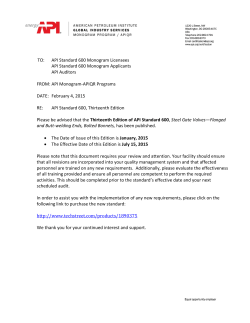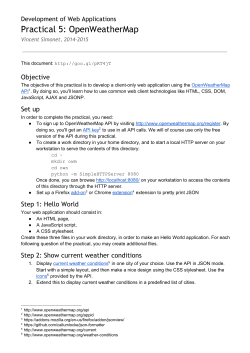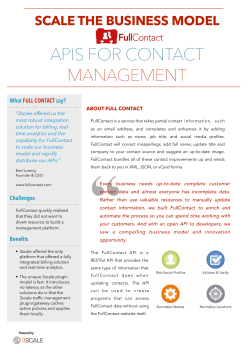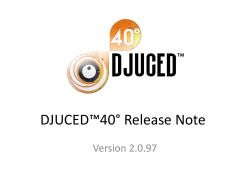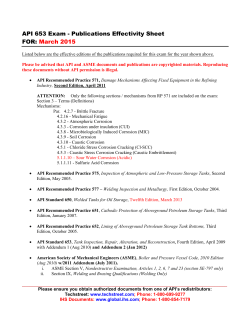
here - The Australian Power Institute
Membership Information What is the API? The Australian Power Institute (API) is a not for profit organisation established as an initiative of the power industry with the vision of achieving: Sustainability and Excellence in Australia's Power Engineering. Achieving this vision will enhance the performance and competitiveness of the Australian power industry organisations. How it works? The API channels membership funds to meet its education and research objectives. The API Board includes members at Senior Executive level representing industry and will determine these objectives. The API will be guided by the following principles: § The API will support universities in all Australian States to enhance their teaching and research capacity in power engineering, encourage high quality students to select power engineering and be challenged as undergraduates, and ensure there are accessible postgraduate programs and experiences that facilitate acquisition and retention of specialist skills necessary for the industry. The university and continuing education structure needs to ensure that professional engineers will continue throughout their careers to acquire engineering skills at the highest level and at the forefront of knowledge, benefiting both individuals and industry. The API will encourage industry-sponsored and supported research with the intention that multi-campus Centres of Excellence in disciplines relevant to the industry’s future will thrive at Australian universities. § § The API will have a coordination and facilitation role and will work through existing educational institutions on a selective and competitive basis. The work oft the API will be Australia wide in its scope and international outlook. The initiative will cover undergraduate, postgraduate, R&D, and continuing professional development. The activities to be supported by the API will include: § § § § § Continuation of support from the API for these activities will be based on performance. § The cooperation of industry and cooperation amongst universities are priorities of the API. § § Postgraduate Courses/ Short Courses in areas of need Undergraduate curriculum development Continuing Professional Development Training - API Summer Schools annually Masterclasses by experts in relevant fields Support to increase the representation of females in Power Engineering Development of distance education and flexible delivery methods Support for applications for government grants, such as through CRC and ARC Programmes Support for industry initiated research, development and demonstration projects Aims and Objectives The Australian Power Institute (API) represents major Australian power companies in addressing the skills gap in power engineering whose Value Proposition is: "To Deliver a Sustainable Supply of Highly Skilled Power Engineering Professionals Working Effectively to Meet the Challenges of Creating Australia’s New Energy Future and Underpin the Technical and Commercial Success of Member Companies in the Energy Sector. This will be achieved through Maximising Collaboration Between Industry, Universities, Professional Bodies and Government in Power Engineering Education, Research and Training" Continuing demand for engineering expertise is being driven by forecasts of significant expenditure in the energy industry, and because energy system architecture is undergoing a period of high technological development and change. Transitioning to a low carbon economy while addressing community concern regarding energy sustainability, security and price demands high quality engineering solutions. Containing electricity prices demands significant innovation in the sector to do more with less. Professional engineering expertise is critical to this innovation. Australia's unique energy challenges means solutions cannot be merely imported from overseas. The supply of power engineers is constrained by an ageing workforce with commencing elevated retirement rates, fragmentation of professional career paths due to changed industry structures, low participation rates in high school advanced maths and science studies, and intense competition from other fields including the mining industry. API research of member companies shows a universal shortage of the Senior Engineers so important in meeting current and imminent technical challenges. As electricity is at the heart of the modern Australian society, commerce and industry, failure to attract, develop and retain the best engineering talent could have dire consequences. Australia could fail to meet its objectives of lower carbon emissions and to supply competitive (low price), reliable electricity to underpin the Australian economy. Australia is facing the greatest transformation in the past century of its energy system by moving to a low carbon, cost effective, reliable energy industry, and critical to achieving this will be attracting and educating highly skilled power engineering professionals. API has developed a number of industry sector strategies to address this issue, and has the strong engagement of the power industry and Australian universities in their implementation. The key objectives of API are: • • • • • Provide a sustainable supply of quality power engineering graduates to industry University undergraduate power engineering teaching and learning provides relevant industry skills Value added continuing professional development programs Support industry innovation initiatives through applied research API is positioned as a respected organisation leading the national development of power engineering skills Organisation and Membership The Australian Power Institute Ltd (API), a company limited by guarantee with income tax exempt status, has been formed to conduct training and other activities. Membership of the API is open to all organisations who have an interest in the power industry in various categories of membership. An annual membership fee is determined by the category of membership. Membership fees will entitle Members to various benefits according to Membership Category. The membership categories are as follows: Governor Members are organisations with substantial and diverse levels of technical expertise requirements with a major role in the power industry, and which are expected to make a long-term commitment to the broad industry and API Governor Members will each be entitled to appoint a director to the Board of the API. Principal Members are major organisations with substantial levels of reliance on technical expertise but with fewer technical staff than Governor Members. Principal Members will be entitled to elect two directors from among themselves to the Board of the API when there are more than eight Principal Members. Industry Members are organisations with a high level of technical involvement in the industry. Industry Members are entitled to vote but have no rights to appoint directors. The Australian Power Institute Membership Information 2015 Governance The API is governed by a Board of industry member nominated directors which will comprise of the following: Not less than 3 but not more than 15 directors A minimum of 2 Directors from an entity operating predominantly in the transmission sector of the electricity industry A minimum of 2 Directors from an entity operating predominantly in the distribution sector of the electricity industry A minimum of 2 Directors representing industry sectors with a close association or relevance to the electricity industry sectors referred to above A minimum of 1 Director from each State. (A Director is taken from a particular State if he or she is from an entity with significant operations in that State in the electricity industry or in an industry sector with a close association or relevance to the electricity industry, whether or not that entity has significant operations in any other State) *The Board of API meets a minimum of 4 times per year Membership Benefits The benefits to individual organisations relate to securing a sustainable source of engineering skills in an industry that has a technically complex asset base supported by specialised engineering capability. The API will ensure: Attraction of high quality students to power engineering specialties University power engineering schools attain excellence towards world’s best standards There is an adequate pool of high quality graduates Support for increasing the representation of females in power engineering Graduate employees have access to rigorous but flexible avenues to acquire specialist skills appropriate to their industry sector There is a process for updating these skills throughout an engineering career; and The university academic staff provides a resource for industry in investigating significant and complex technical issues. Membership of the API ensures these advantages are available to each participating organisation. The achievement of these goals will benefit individual organisations by: The availability of high quality engineers Access to API Bursary students for vacation employment projects An ability to update their skills and employees' skills with minimum disruption to work Enhanced capability to introduce and support new technology Specific benefits of membership are: Concession fees for Continuing Professional Development Programs run by API Regular newsletters setting out trends and other information regarding power engineering education A bi-annual Workforce Planning Survey Report of available statistics regarding industry workforce needs, student numbers and academic numbers and activity For Governor and Principal Members: Direct involvement in setting objectives and reviewing performance by having the ability to appoint directors to the Board of API Opportunities for direct access for visiting experts involved in API Programs The Australian Power Institute Membership Information 2015 Contacts The Australian Power Institute Ltd. Contact: Postal Address: Mike Griffin Chief Executive Email: mike.griffin@api.edu Endeavour Energy PO Box 811 Seven Hills NSW 1730 Website: www.api.edu.au The Australian Power Institute Membership Application Form The Membership Application is for the consideration by the Board of the API.
© Copyright 2025
